Woman Tells Her Partner to Help Clean Up Dog Poop, Partner Insists on Finishing Up His Live Game First
Pets are a great addition to our homes, but there's no denying that they also add a lot of mess to our lives, whether it's from jumping on the furnishings or leaving unsavory traces of their whereabouts. Although dog poop may not seem like the most glamorous topic, pet parents should be conscious of many factors when it comes to this, shall we say, messy subject.
Every dog owner has stood outside while their canine went potty at least once, often wearing rain or snow boots. When you open the door to let your dog outside in the rain, sleet, or snow, the animal immediately stands its ground.
Oh, it's frustrating. Dogs are creatures of routine and comfort, just like humans, so it's important to find a solution to this and learn how to train your dog to do its business outside.
Meet u/splootsaredabest, the original poster of today's story, whose partner had taken their dog outside to poop but didn’t notice that he still had poop stuck on his bum. The dog comes in and sits on the couch while the OP is napping.
When she woke up, she smelled something and then noticed the dog still had poop stuck to him. Worst of all, it’s now also on the couch, pillows, and blanket.
She tells her partner to help her clean up, but he says he's on a live game. Read the full story below.
The Headline...

When the OP woke up, she could perceive something, then she noticed the dog still had poop stuck to him.
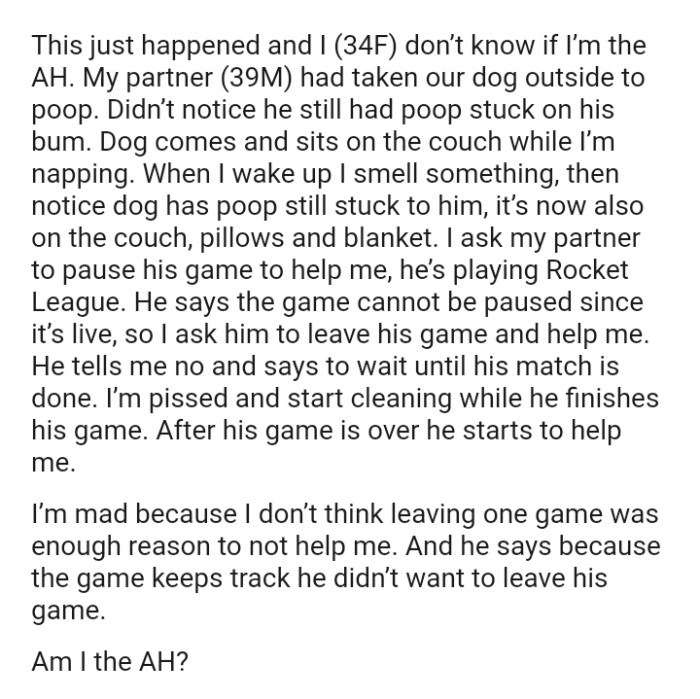
Here is what other Redditors thought about the story posted by the OP.

The Psychology of Responsibility in Relationships
The conflict arising from the Redditor's request for her partner to help clean up after their dog underscores the psychological dynamics of responsibility within relationships. Research indicates that perceived inequity in shared responsibilities can lead to feelings of resentment and frustration. Studies published in the Journal of Family Psychology show that an unequal distribution of household tasks often correlates with decreased relationship satisfaction.
In this case, the partner's insistence on finishing a game before attending to the dog may signal a deeper reluctance to engage in shared responsibilities.
The Psychology of Domestic Tasks
The conflict over cleaning responsibilities, particularly in relation to unpleasant tasks like dog poop cleanup, reflects broader psychological themes surrounding equity in household chores. Research by the University of California, Berkeley, highlights that perceived inequity in domestic responsibilities can lead to significant relationship stress. In this scenario, the partner's insistence on finishing a live game before addressing the task may signal a disconnect in their sense of priorities and responsibilities.
This situation is often exacerbated by differing expectations regarding household roles and the value placed on various tasks.
He can give up his game and go help.

Necessities take precedence over playing games.

He's the cause of the problem, so he should fix it.

From a behavioral psychology perspective, the partner's actions could reflect a prioritization of personal leisure over shared obligations. Research suggests that individuals often struggle to balance personal interests with relationship commitments, leading to conflicts about responsibilities. Understanding these priorities can help both partners address their needs more effectively and negotiate their roles within the relationship.
It’s crucial for partners to have open discussions about their expectations regarding responsibilities.
Moreover, the psychology of procrastination plays a significant role in situations like this. According to Dr. Timothy Pychyl, an expert on procrastination, individuals often delay unpleasant tasks due to difficulties in emotional regulation. The partner's focus on finishing a game might be a way of avoiding the negative feelings associated with cleaning, a common phenomenon known as 'task aversion.'
Understanding these underlying motivations can help partners navigate their differences more effectively.
Cleaning dog poop is pretty pressing and important.

He is way too immature for you two to live together.

You admitted that you didn't have to wait long.

Strategies for Effective Communication about Responsibilities
To resolve such conflicts, partners can benefit from employing effective communication strategies that promote understanding and cooperation. Research in conflict resolution emphasizes the importance of using 'I' statements to express feelings without blaming the other party. This approach can help each partner articulate their needs while fostering an environment of collaboration and shared problem-solving.
For example, the Redditor might communicate her feelings about the situation by saying, 'I feel overwhelmed when I have to handle the dog while you’re preoccupied with your game.' This can lead to constructive dialogue about shared responsibilities.
Communicating Expectations Clearly
Effective communication is key in addressing conflicts related to household responsibilities. Research from the American Psychological Association emphasizes that expressing feelings and expectations clearly can lead to more equitable divisions of labor in relationships. In this case, the partner may benefit from discussing how both individuals can contribute to household tasks in a way that feels fair and respectful.
Using collaborative language, such as 'How can we ensure both of us are comfortable with our chores?' can foster a more supportive dialogue.
He should have checked for extra stuck-on poop before playing a game.
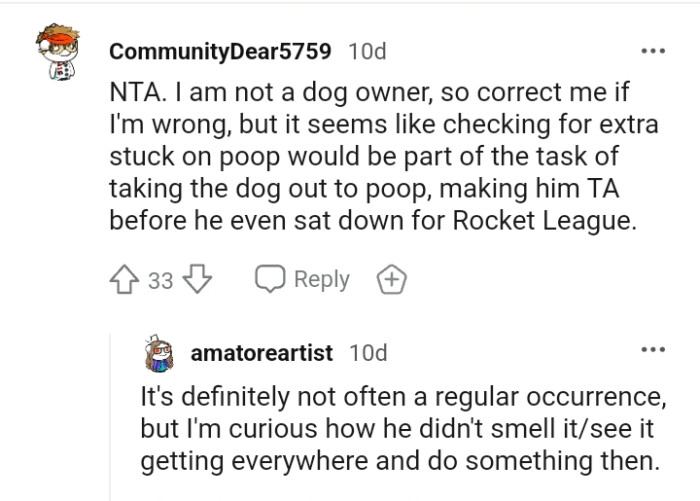
An info asked, and answer given.
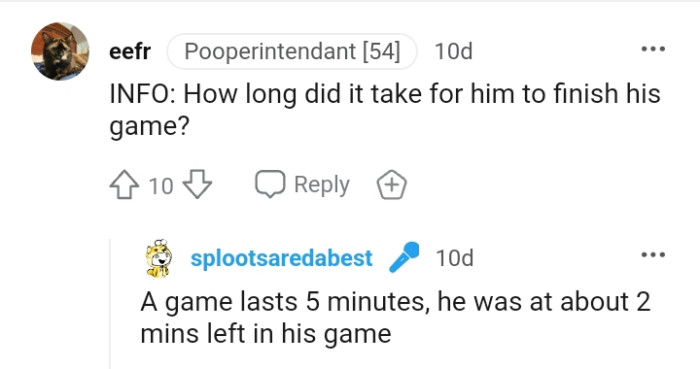
A ranked game is still just a game.
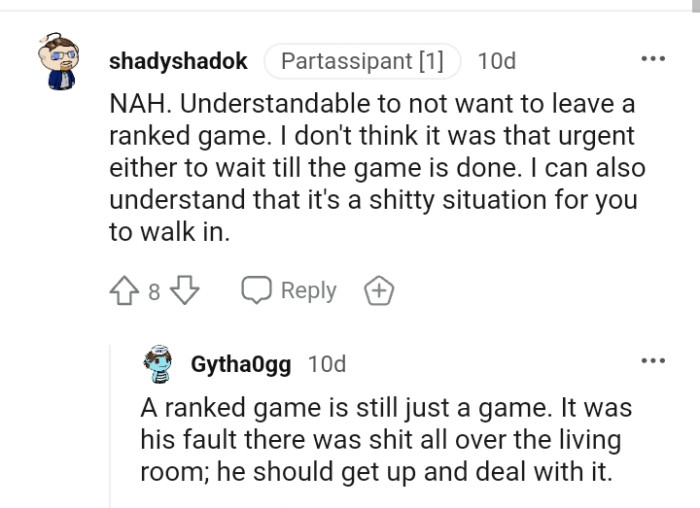
Additionally, exploring the reasons behind the partner's behavior can provide insight into potential solutions. The partner's reluctance to engage might stem from a need for personal time or a lack of understanding about the shared responsibilities involved in pet ownership. Research indicates that discussing motivations and expectations can lead to greater empathy and cooperation between partners.
By understanding each other's perspectives, the couple can work towards establishing a more equitable division of labor.
Additionally, couples might explore strategies to make unpleasant tasks more enjoyable. For example, they could listen to music or podcasts while cleaning or set a timer for a quick cleanup session. Research suggests that making tasks more enjoyable can reduce resistance and increase cooperation in household responsibilities.
By framing chores as shared experiences rather than burdens, couples can foster a sense of teamwork and collaboration in managing their home.
The matches are only a few minutes long.
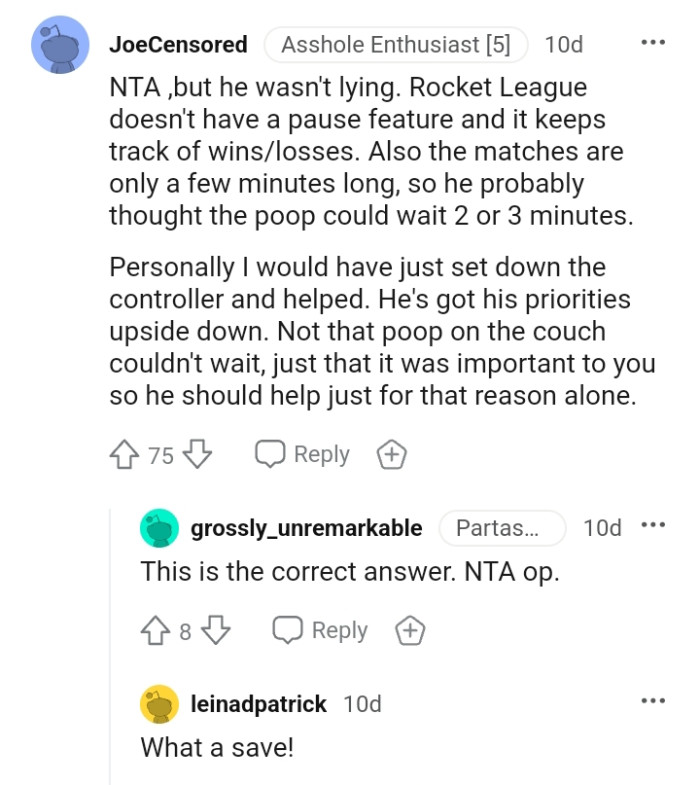
He'll remember to check the dog over for hangers.
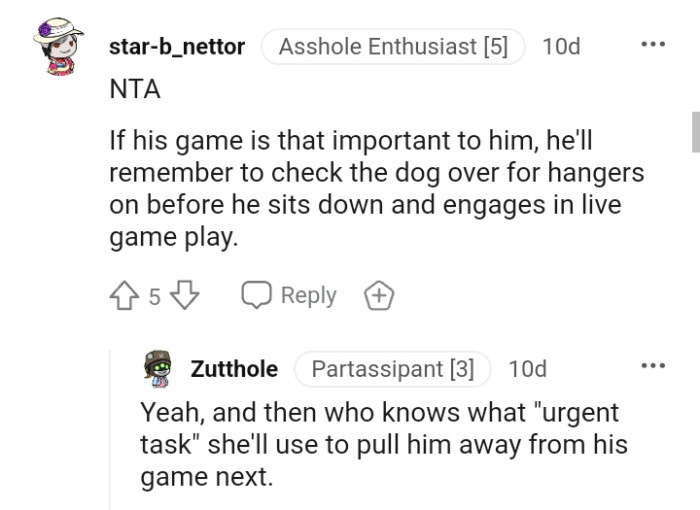
It's his fault for not cleaning up properly.

The Importance of Shared Goals
Ultimately, aligning on shared goals regarding household responsibilities can help mitigate conflicts. A study from Harvard University suggests that couples who engage in discussions about their values and priorities are more likely to achieve a harmonious living environment. In this case, discussing their shared goals regarding cleanliness and responsibility can help both partners feel equally invested in maintaining their home.
By fostering a sense of unity in their approach to household tasks, couples can work together to create a more balanced and satisfying living situation.
Anything that isn't an emergency is fine to wait a couple of minutes.
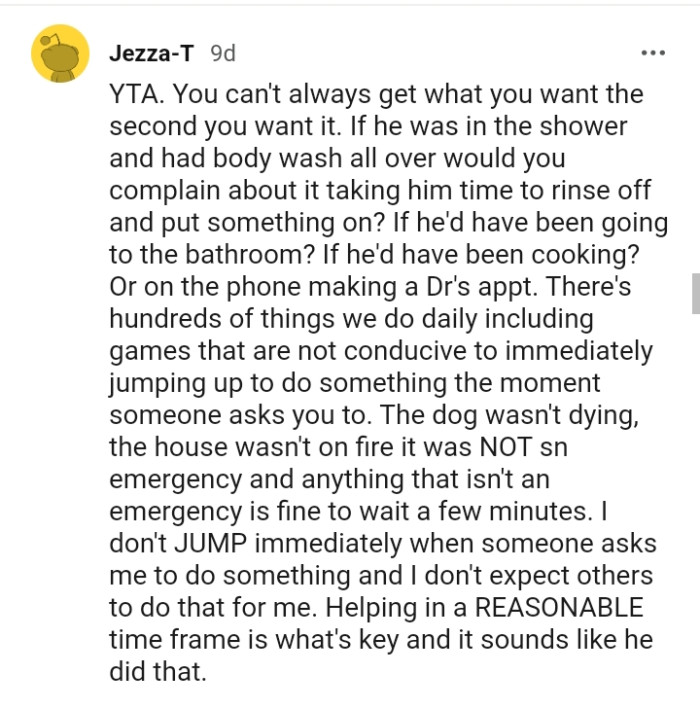
Two minutes wouldn't have made such a difference.
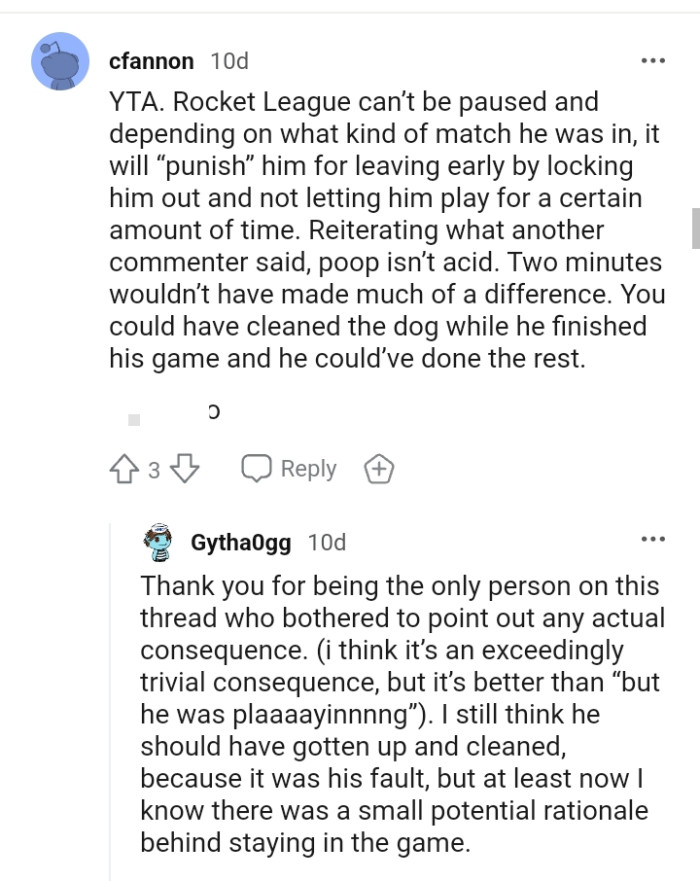
These people are being ridiculous.
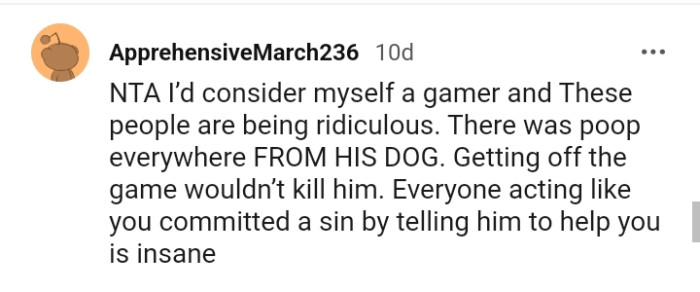
There are worse things a partner could be doing.
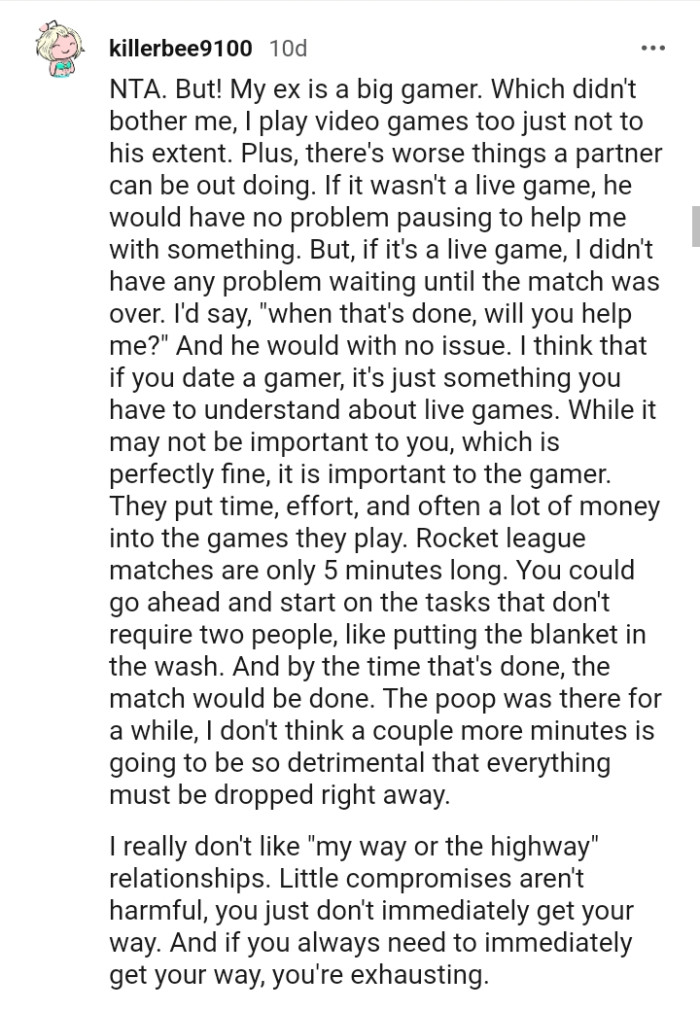
He would have been done in a couple of minutes.
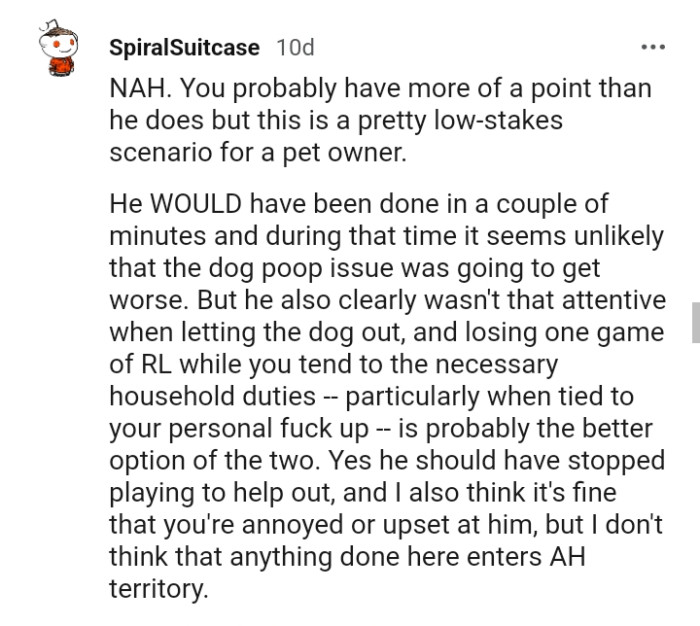
The dog poop on stuff isn't life or death.
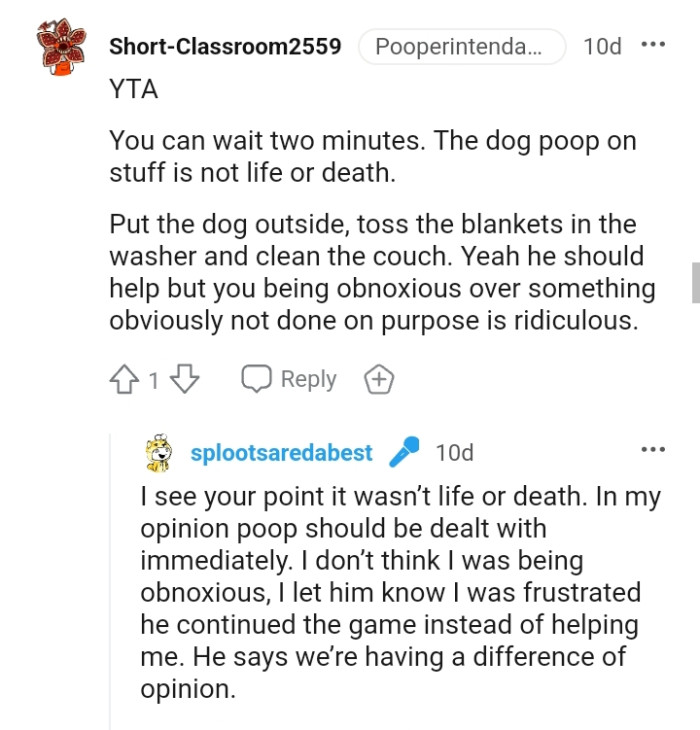
A few more minutes to finish up isn't a big deal.
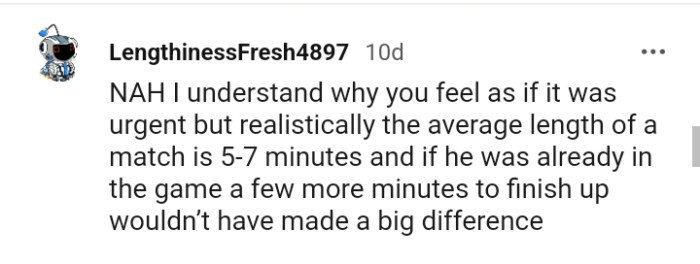
The OP's partner made an honest mistake, and both had things that were important for them to do at that moment. Redditors say that it's an honest misunderstanding on her part not to know the penalties that can hit leavers in online games, and it was important for him to finish that round quickly.
Leave your thoughts about this story in the comments and share as well.
Psychological Analysis
This situation illustrates the tension between personal priorities and shared responsibilities within a relationship. It's important for both partners to communicate their needs and expectations clearly.
By fostering a collaborative approach to household chores, couples can create a more supportive and equitable living environment.
Analysis generated by AI
Analysis & Alternative Approaches
In conclusion, navigating household responsibilities requires open communication and a commitment to fairness. By understanding the psychological factors at play and aligning on shared goals, couples can foster a more harmonious living environment.
As noted in various studies, equitable divisions of labor are essential for relationship satisfaction.
Analysis & Alternative Approaches
In conclusion, addressing shared responsibilities in relationships is essential for maintaining harmony and satisfaction. By fostering open communication and exploring each other's motivations, couples can navigate conflicts more effectively and strengthen their partnerships.
Ultimately, creating a balance between personal interests and shared obligations is key to a fulfilling relationship.



